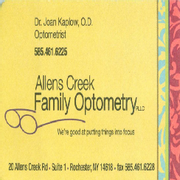
In many cases, blurry vision—especially when reading material up close—is the result of being nearsighted. For some, this blurry near vision is the result of another eye health issue known as convergence insufficiency. While it may not always be easy to recognize this problem right away, it can be treated and allow individuals to improve their sight. To help you identify this issue and seek help from an eye doctor, here are a few frequently asked questions about convergence insufficiency to review.
Common Questions About Convergence Insufficiency
What is convergence insufficiency?
Convergence insufficiency is when the eyes are unable to work together to process images in front of them. Specifically, the eyes will drift outward, making it difficult for them to converge and create a single, unified image, causing extreme blurriness.
Who does the problem affect most?
Since this condition can make reading difficult, young children are most commonly diagnosed once they enter school. While this issue can affect any person, those with a family history of the disorder face a higher risk of developing the problem.
What are the signs of this condition?
 The severity of convergence insufficiency symptoms can vary, with some individuals barely recognizing the problem. In many cases, the issue will cause double vision or blurriness that makes reading and concentrating difficult. Often, parents may detect the problem if they notice kids squinting or closing an eye to temporarily correct double vision. This continuous eyestrain may also lead to fatigue and headaches.
The severity of convergence insufficiency symptoms can vary, with some individuals barely recognizing the problem. In many cases, the issue will cause double vision or blurriness that makes reading and concentrating difficult. Often, parents may detect the problem if they notice kids squinting or closing an eye to temporarily correct double vision. This continuous eyestrain may also lead to fatigue and headaches.
Can you prevent the issue?
While eye doctors connect this condition to poor muscle coordination, the exact cause of this underlying problem remains unknown. As such, there are no verified prevention techniques that children can practice.
How is it treated?
Although this condition cannot be prevented, it can be effectively treated with the help of an eye doctor. Often, optometrists will prescribe vision therapy—a series of unique exercises that train the eyes and correct their challenges with teaming. Some of these exercises may be completed at a vision center while others may be done comfortably at home.
If you believe convergence insufficiency is affecting you or your child’s vision, Allens Creek Family Optometry has the resources to help. Through a comprehensive eye exam, the optometrists at Allens Creek will measure sight abilities and diagnose what specific issues are causing them. After a thorough diagnosis, the doctor will develop custom treatments—including vision therapy—to improve eye teaming. To learn more about these services, visit us online or call (585) 461-6225.
About the Business
Have a question? Ask the experts!
Send your question

